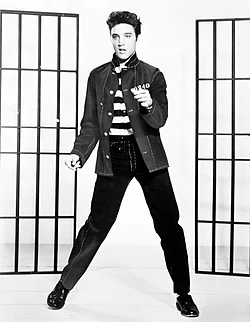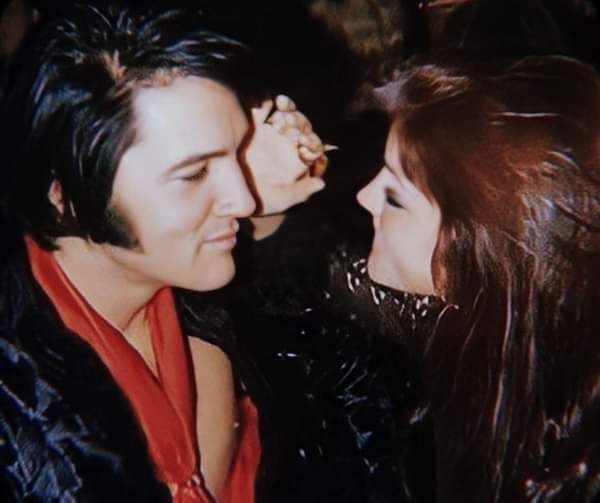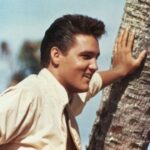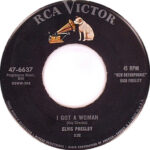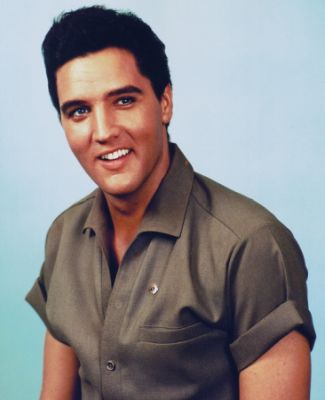
Elvis Presley Radio Station
FLAMING STAR
– A Challenging Role for Presley –
(Part 7)
By Mariusz Ogieglo
On August 25, just after arriving in Los Angeles, Presley was invited to take part in a special photo shoot for the popular American weekly * LIFE. At Colonel Parker’s express request, the photos taken during the shoot – some of the most popular ever taken of the singer – were to appear not only in the aforementioned magazine but also on the covers of Presley’s future record releases, including the single “Are You “Lonesome Tonight?” released a few months later and the longplay “His Hand In Mine”. Of course, Elvis’ manager also intended to use them to promote the aforementioned releases.
The session was arranged at the Beverly Wilshire Hotel and Don Cravens was behind the lens. An extremely respected American photographer who has documented the most important and groundbreaking moments in American history for years. And not only.
Beginning with World War II, which caught him in his first year of studies at the Cinematography Department (during the war he was a cameraman), through the war criminals’ trial in Nuremberg to the failed assassination attempt on the President of France, Charles de Gaulle, in August 1962 and the assassination of John F. Kennedy in November of the following year.
Cravens had met Elvis in the late fifties, shortly after the singer had been drafted into the army, and then – as Colonel Parker was particularly keen on – he had accompanied him to Germany for about a month. At the time, the photographer was living in Bad Nauheim, near the house at Goethestrasse 14 that Presley had rented and shared with his family and friends during his service. “I didn’t want to go to Elvis’s for breakfast…” he confided in the August 1986 article “Breakfast with Elvis.” “His grandmother lived with him, and two or three of his buddies, who were later called the Memphis Mafia. She would fry up big slabs of bacon, and he (Elvis, author’s note) would take the toast there, dip it in bacon grease, and eat it – which really pissed me off. But Elvis insisted. So I got fried eggs dipped in bacon grease and a mountain of toast .”
Around the same time, Cravens also took his first photos of Elvis, showing him shaving in the woods, driving a tank, and playing guitar at home. In later interviews, the photographer emphasized that Presley did not like to take part in such sessions. “It was hard to get him to pose ,” he recalled. “‘The colonel’s going to come and give us hell,’ I’d say. To which he’d reply, ‘Don’t worry, he hasn’t called me about that yet .'”
When talking about Cravens, it is impossible not to notice that he was also one of the few people Parker really respected and often took their advice. So much so that when Elvis’ satellite concert, “Aloha From Hawaii”, was being filmed in the mid-seventies, Parker called him and asked him to help him identify the most beautiful and interesting locations in Hawaii that would be suitable for filming and showing in the American version of the program.
The day after the LIFE shoot was finished, on August 26, Elvis returned to work on the film. Filming continued at 20th Century Fox in Hollywood, a facility that was generally closed and difficult to access for casual gawkers and outsiders.
Still, even in such a place, Colonel Parker caught the scent of an opportunity to make a few bucks on merchandise bearing his client’s name or photo. “I remember the Colonel had a little desk there from which he sold Elvis records and memorabilia. Only inside the soundstage ,” recalled a clearly surprised Barbara Eden. “I looked at it. Then again and I still couldn’t believe it .”
At the earliest opportunity, the actress did not hesitate to ask Elvis what he thought of her enterprising manager. “People talk a lot about the Colonel, but he’s good to me ,” she heard in reply. “I was nobody until I met him. I was only doing small shows then. He made me what I am. I appreciate him and I will always listen to him .”
More than her unbounded trust in Parker, Eden was concerned about the effects of the then twenty-five-year-old singer’s incredible popularity and his gradual isolation from the world around him. When she asked Elvis if he ever found time in his busy schedule to watch television, he told her that it was his only source of information and window on the world. “Barbara, that’s all I do ,” Presley reportedly said. “I can’t go outside normally, and I have to stay in my room all the time .”
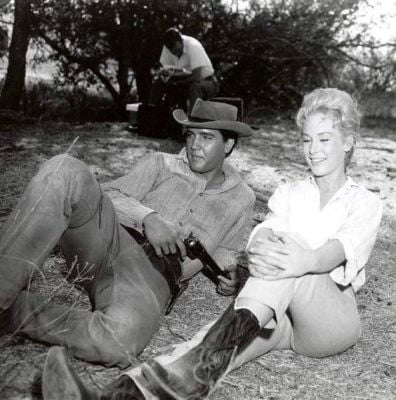
” I feel like it was like a prison ,” the actress said. “The only time he was really free and happy was when he was on stage. When I met him on set, he had friends from Memphis around him who were very close to him. He called them his cousins ??- some of them were. I get that. But his father was there too. They would sit in chairs and sing. ‘We are the chosen ones,’ Elvis would say. They would sing a little bit of this, a little bit of that. It was really, really nice. Everything was very easy with him, and they were really good people .”
Filming for Presley’s sixth film continued until early October. During that time, several working titles were used interchangeably on the set – “Flaming Heart”, “Flaming Lance”, “Black Heart” and finally “Black Star”. On September 2, however, the film was finally renamed “Flaming Star”.
So the studio bosses naturally asked Elvis to record a new title song (the song “Black Star” recorded in August had been considered such). But they unexpectedly encountered resistance from the Colonel. ”
He tried to move them ,” wrote Ernst Jorgensen in his book Platinum: A Life In Music.
Elvis’ manager explained to Fox that in such a situation they were left not only without a title track but also without a record that could promote their new film. Upon hearing this, the studio agreed to his terms and agreed to pay Presley an additional fee of five thousand dollars for recording a new, only slightly changed lyric to the melody of “Black Star”. Still, as Ernst Jorgensen wrote, “there was no guarantee that the Colonel would release the song as a single after he had implemented a policy of releasing only four singles a year “.
However, the session took place only in October.
Earlier, Elvis had finished shooting the film. Filming for “Flaming Star” continued throughout September and the first few days of October, and the singer was visited on the set by, among others, his father, accompanied by Mr. and Mrs. Nichols (September 26), and Garry Pepper, the wheelchair-bound twenty-seven-year-old president of his fan club “The Elvis Tankers,” who had come to Hollywood with a few friends from Memphis. “How are you? ” Elvis greeted him, clearly delighted. “You look great. I’m glad to see you here .”
In an interview that same day (September 29) with Vernon Scott of the Los Angeles Times, Presley called Pepper “one of his best friends .”** He added, “When I go back to Memphis, Gary spends almost every night with me “We go out and have a good time. Gary was one of the first people to greet me at the train station when I got back from the army.
Pepper, who was present at the conversation, briefly commented on Elvis’s words: “It gets kind of boring when Elvis’s not home .”
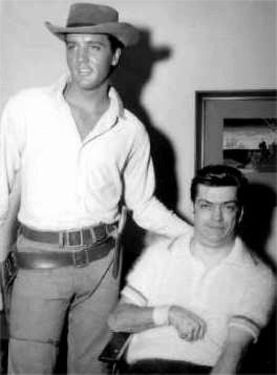
And when a Los Angeles Times reporter asked the singer what he thought about calling Memphis his home, Elvis replied without hesitation: “I always enjoy coming back to this part of the country. The people there are just wonderful. Take Gary, for example. “I’ve never met anyone nicer than he is .”
Work on Presley’s new film officially wrapped on October 4, 1960. Three days later, however, on Friday evening, October 7, Elvis had to return to the Radio Recorders studio to, as mentioned above, record a new version of the title song.
On the recordings, as before, he was joined by guitarists Howard Roberts and Hilmer J. ‘Tiny’ Timbrell, bassist Michael ‘Myer’ Rubin, keyboardist Dudley Brooks, drummer Bernie Mattinson and accordionist Jimmie Haskell. Vocal accompaniment was provided by The Jordanaires.
This time, however, Elvis recorded the Sid Wayne and Sherman Edwards composition in just under three hours, and as Piers Beagley of the Elvis Information Network stated, “the lyrics to ‘Flaming Star’ were a much better fit for the original melody .”
As a result of the recording session, which ended at approximately 11 pm, 20th Century Fox and RCA Victor received two new, long-awaited master versions. The aforementioned “Flaming Star” and its slower counterpart, the so-called “Flaming Star” (End Title), intended for the closing credits of the film in progress.
- LIFE magazine was published weekly until 1972. It was not until 1978 that it began to be published monthly.
- The account of this meeting appeared in an October 1960 article by Vernon Scott entitled “Wheelchair Pal Gives Elvis Boots”
- That’s all that’s changed in the song’s lyrics. The previous title “Black Star” has been replaced by a new, current one – “Flaming Star”
Information provided by EP Promised Land http://www.elvispromisedland.pl/ , Mariusz Ogieglo
If you want to visit more articles about the life of Elvis Presley, enter the following Elvis Radio 24h link: https://elvisradio24h.com/tag/articles Thanks TCB
We remind you that you can also listen to Elvis Radio 24 hours on your mobile phone by downloading our free applications for Android in the Play Store https://play.google.com/store/apps/details?id=com.icreo.elvisradio24h1, and for iPhone in your Apple Store https://apps.apple.com/app/elvis-radio-24h/id6444257119. Thank you very much!!..
